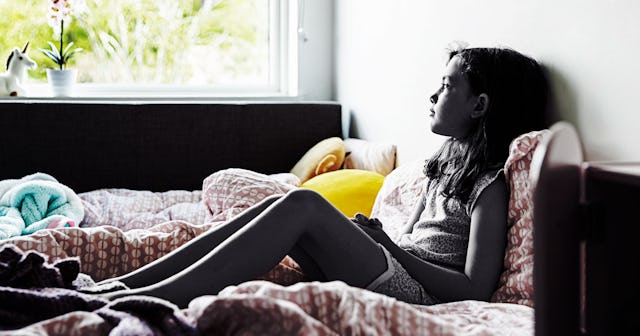COVID-19's Surprising Silver Lining For People With PANS & PANDAS

For two decades, parents of children with symptoms of mental illness have walked into physicians’ offices clutching articles and begging for a strep test, basic labs, or a trial of antibiotics. Suspecting their child has Pediatric Acute-Onset Neuropsychiatric Syndrome (PANS) or its subset, Pediatric Autoimmune Neuropsychiatric Disorders Associated With Streptococcal Infections (PANDAS), they are desperate for someone to listen and offer relief.
Plagued by debilitating psychiatric and neurological symptoms, the children present with severe symptoms. They can appear to have bipolar disorder or even schizophrenia. Frequently, they’re unable to attend school, lose their ability to write, draw, and complete math problems they had previously mastered. Some are anorexic. Others experience literally hundreds of tics every hour. In severe cases, families find themselves having to split parents and siblings into separate homes in order to keep everyone safe. Families rapidly become isolated, often subjected to accusations that the symptoms are the fault of the parents—that out-of-control children are the result of lack of discipline. In the best scenarios, families aren’t subjected to blame, but friends, family, and school staff simply cannot comprehend what is happening. Without understanding, there is no support. No meal train. No texts to check in. No GoFundMe. The stigma of mental illness looms as a thick cloud over the families.
As one would expect, the parents turn to the medical community, pleading with their doctors for help beyond the standard response: We aren’t sure PANS is real. This is psychiatric. You need to accept it.
But the parents who have scoured medical journals at all hours of the night, heard the remarkable recovery stories of children treated at reputable institutions, and watched their child plunge into pure misery before their eyes have not accepted it.
Carlo107/Getty
Acceptance is meant for conditions that cannot be cured or put into remission, not for whatever happened to their once content child who descended into a nightmare of severe anxiety, obsessive-compulsive disorder, tics, aggression, bedwetting, loss of skills, sleep problems, and restricted eating. Acceptance is out of the question for those suddenly parenting a stranger tormented by hallucinations and suicidal or homicidal ideation. Considering day-to-day survival is a struggle, acceptance is unthinkable.
So, since the publication of the first paper describing the illness in the nineties, parents have fought to get their children well, often leaving the state for care and usually spending far more money for treatment than they ever could have imagined. While many children respond dramatically to anti-inflammatories and antibiotics, they have to get past a critical and often insurmountable barrier: accurate diagnosis. Though scientific literature details the impact an immune system gone rogue can have on the brain, the information has barely trickled into clinical practice, meaning a PANS diagnosis can prove exceptionally elusive.
Enter COVID-19.
Amidst worldwide devastation including lost loved ones, financial turmoil, isolation, and tremendous stress, COVID-19 has provided the PANS community with something that years of pleading with the medical community failed to do. Parents who were told it was just plain silly to think an infection caused the terrible symptoms in their kids, who had doors shut in their faces following vague comments about “evidence-based medicine,” can see COVID-19’s bold and bright silver linings: Validation. Funding. Acknowledgment that infections do trigger neuropsychiatric symptoms that deserve medical treatment.
Seemingly overnight, medical journals overflowed with study after study showing that neurologic and psychiatric symptoms are not uncommon in the weeks and months following COVID-19. Long after the infection clears, formerly healthy people are experiencing severe and debilitating mental health crises. In stark contrast to those who have suffered from PANS following infection, mainstream recognition of post-COVID-19 illness has become ubiquitous in mere months. The amount of money being poured into research to explain the mechanisms and to find treatments has sufferers of all types of similar illnesses, from PANS to myalgic encephalomyelitis/chronic fatigue syndrome, hopeful for the first time in years. While advocates have squeezed out, on average, under a million dollars per year in funding for PANS research with barely any serious interest nor investment from the NIH, COVID-19 research has already commanded billions in funding, and it’s just over a year old. Treatment and answers are on the horizon and patients and families are excited.
Still, resentment persists. To say experiencing PANS is deeply traumatizing for all family members is an understatement. A study by Stanford School of Medicine found the burden to caregivers equal to severe and devastating childhood diseases. Parents who have lived through PANS as well as civil war, bombings, amputations, and childhood cancer have described their experience with PANS as even more difficult. To be not only neglected by the medical community but told your reality doesn’t exist while you watch your child suffer immeasurably leaves deep scars.
Even so, hope is a powerful tonic for those who have been swallowed whole by a disorder that overtakes the mind. COVID-19 has made abundantly clear what PANS families have tried to convey for years. And while a grand apology for the suffering families have endured seems unlikely, funding for research and widespread acknowledgement that infections can trigger psychiatric symptoms, are not bad consolation prizes.